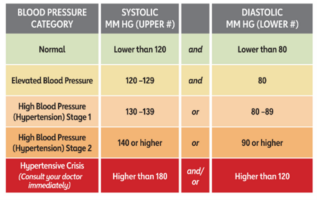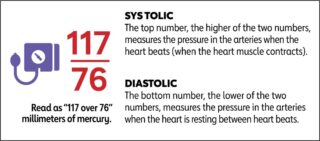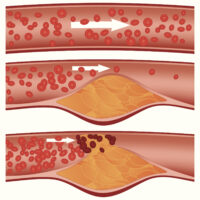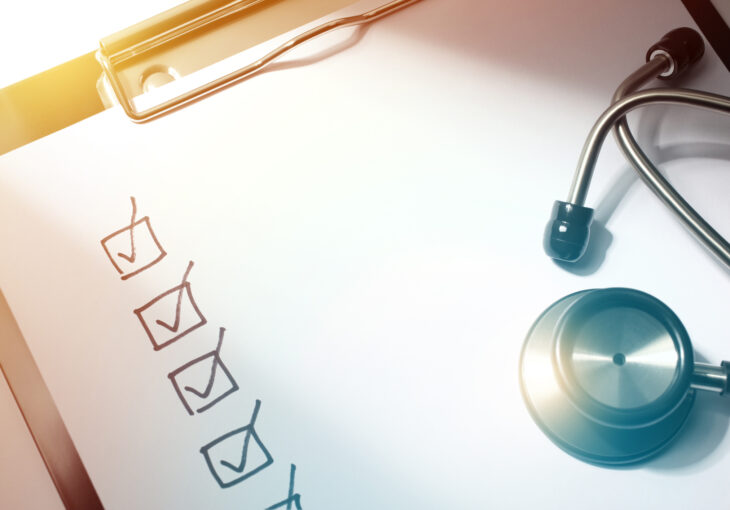Life’s Essential 8™ are the key measures for improving and maintaining cardiovascular health, as defined by the American Heart Association. Better cardiovascular health helps lower the risk for heart disease, stroke and other major health problems. Sponsored by Main Line Health, this blog explores the significance of the American Heart Association’s Life’s Essential 8 checklist, with a focus on blood pressure and cholesterol.
Cardiovascular disease is the No. 1 cause of death in the U.S. and globally. According to the American Heart Association’s 2023 Heart Disease and Stroke Statistics Update, approximately 122.4 million people in the U.S. have high blood pressure, 100 million have obesity, more than 28 million people have Type 2 diabetes, and only 1 in 4 adults reported achieving the physical activity and exercise recommended. Various research studies over the past two decades indicate more than 80% of all cardiovascular events may be prevented by healthy lifestyle and management of known cardiovascular risk factors.
 Dr. Monali Shah is a cardiologist at Lankenau Heart Institute, part of Main Line Health. Her practice focuses on caring for people with or at risk for coronary artery disease, high cholesterol levels, high blood pressure, valvular heart disease, abnormal heart rhythms, and heart failure. She works with her patients to understand their personal risk for cardiovascular disease and take steps to lower their risk.
Dr. Monali Shah is a cardiologist at Lankenau Heart Institute, part of Main Line Health. Her practice focuses on caring for people with or at risk for coronary artery disease, high cholesterol levels, high blood pressure, valvular heart disease, abnormal heart rhythms, and heart failure. She works with her patients to understand their personal risk for cardiovascular disease and take steps to lower their risk.
“I strive to offer my patients the type of care I would want for myself or my family, which is personalized cardiovascular care based in a partnership with the patient and guided by current best evidence,” said Shah. “The American Heart Association’s Life’s Essential 8 checklist is a great resource for everyone as it breaks down the key areas to help develop and manage cardiovascular health.”
Life’s Essential 8 comprises two major areas—health behaviors and health factors.
The health behaviors include:
- Eat Better
- Be More Active
- Quit Tobacco
- Get Healthy Sleep
And the health factors are:
- Manage Weight
- Control Cholesterol
- Manage Blood Sugar
- Manage Blood Pressure
 Shah puts an emphasis on No. 8. “High blood pressure, or hypertension, is referred to as the silent killer because it often has no obvious symptoms to indicate that something is wrong. Many people with high blood pressure don’t even know they have it,” she said.
Shah puts an emphasis on No. 8. “High blood pressure, or hypertension, is referred to as the silent killer because it often has no obvious symptoms to indicate that something is wrong. Many people with high blood pressure don’t even know they have it,” she said.
Philadelphia has one of the highest self-reported hypertension prevalence rates in the nation (34% of adults).
A diagnosis of high blood pressure must be confirmed with a health care professional.
“It’s important to know your numbers,” Shah said. “A normal blood pressure is lower than 120 systolic, which is the top number. And lower than 80 for diastolic—the bottom number.”

High blood pressure can be managed effectively through lifestyle changes and, when needed, medication.
Shah also calls out No. 6 on the Life’s Essential 8 list: Control Cholesterol.
“People know the term ‘cholesterol,’ however it can be a confusing topic,” she said.
Cholesterol is a waxy substance. It’s not inherently “bad.” In fact, your body needs it to build cells. But too much cholesterol can pose a problem.
Cholesterol comes from two sources: food and your body. It is found in foods from animal sources only and travels in the body by lipoproteins – LDL and HDL.

“HDL helps keep LDL from sticking to artery walls and reduces plaque buildup. This process can lower the risk of heart disease and stroke,” Shah explained.
A high triglyceride level combined with high LDL (bad) cholesterol or low HDL (good) cholesterol is linked with fatty buildups within the artery walls, which increases the risk of heart attack and stroke.
“Triglycerides are the most common type of fat in the body. They store excess energy from your diet,” Shah said.
Just like high blood pressure, it’s important to track your cholesterol levels. A health care professional can measure your blood cholesterol and help you understand what the levels mean in context of your overall heart health.
Shah offers a few tips for success in controlling high cholesterol and blood pressure that come directly from Life’s Essential 8.
“Physical activity helps improve cholesterol levels and control blood pressure, weight and stress levels,” she said. “Poor quality of sleep is also associated with high blood pressure. And, of course, no nicotine. Smoking lowers good HDL cholesterol, raises blood pressure and increases your risk of heart disease.”
Shah also notes the importance of eating smart.
“Making good choices and swaps to build an overall healthy eating style is key,” she said.
She suggests eating a diet of vegetables, fruits, whole grains, beans, legumes, nuts, plant-based proteins, lean animal proteins like fish and seafood. “Limit sugary foods and drinks, red or processed meats, salty foods, refined carbohydrates and highly processed foods.”
High blood pressure and high cholesterol are two of the major controllable risk factors for coronary heart disease, heart attack and stroke.
“There is no greater motivation to make changes than living a longer, healthier life,” Shah said. “Following the Life’s Essential 8 checklist and knowing your numbers could mean more time and more memories with your loved ones.”
Learn more about the American Heart Association’s Life’s Essential 8 checklist here.
